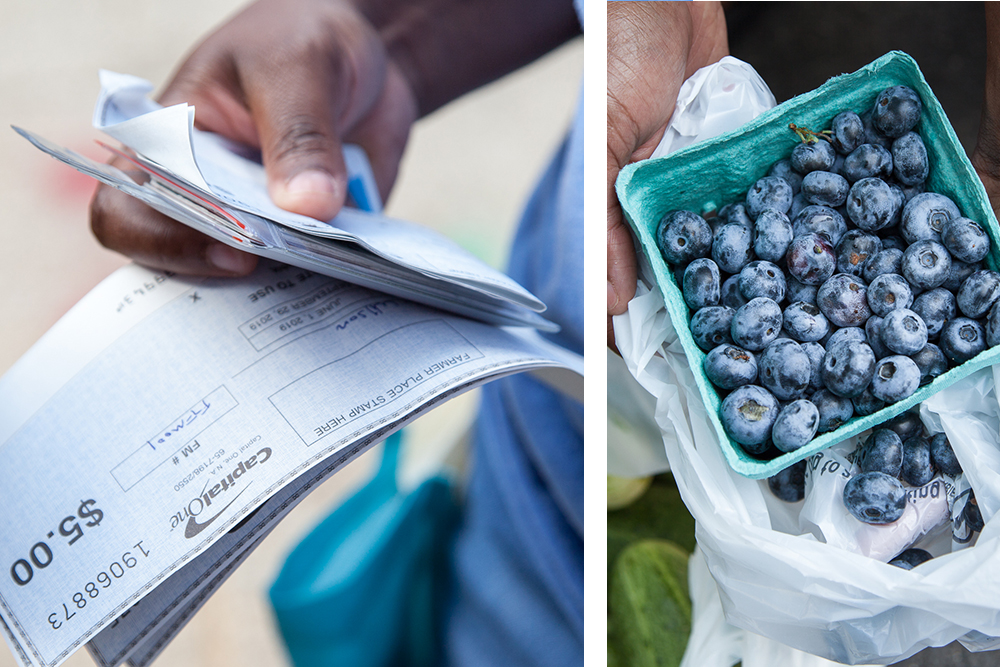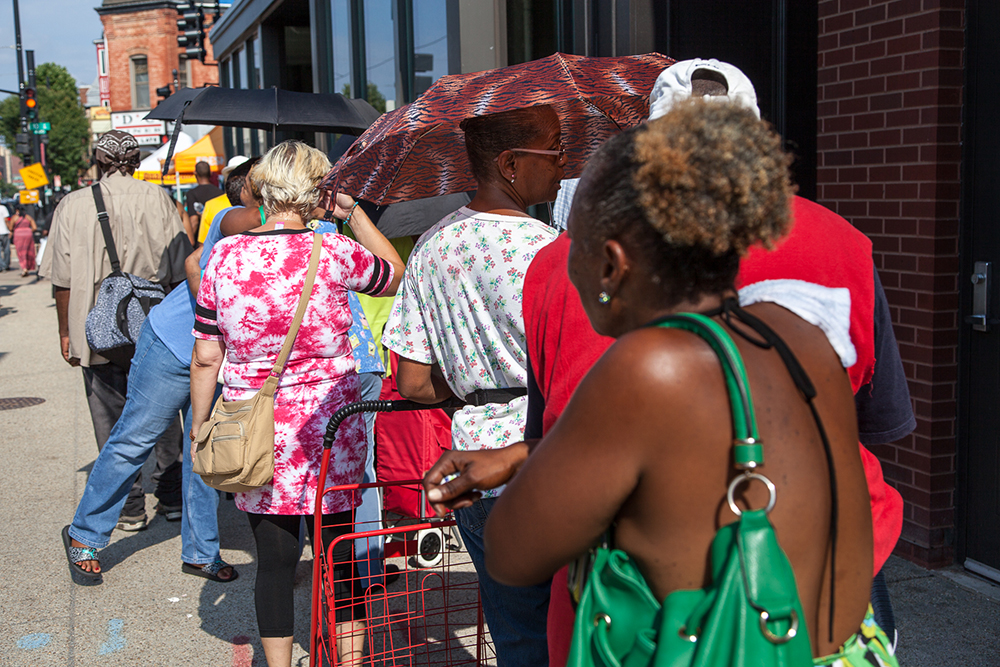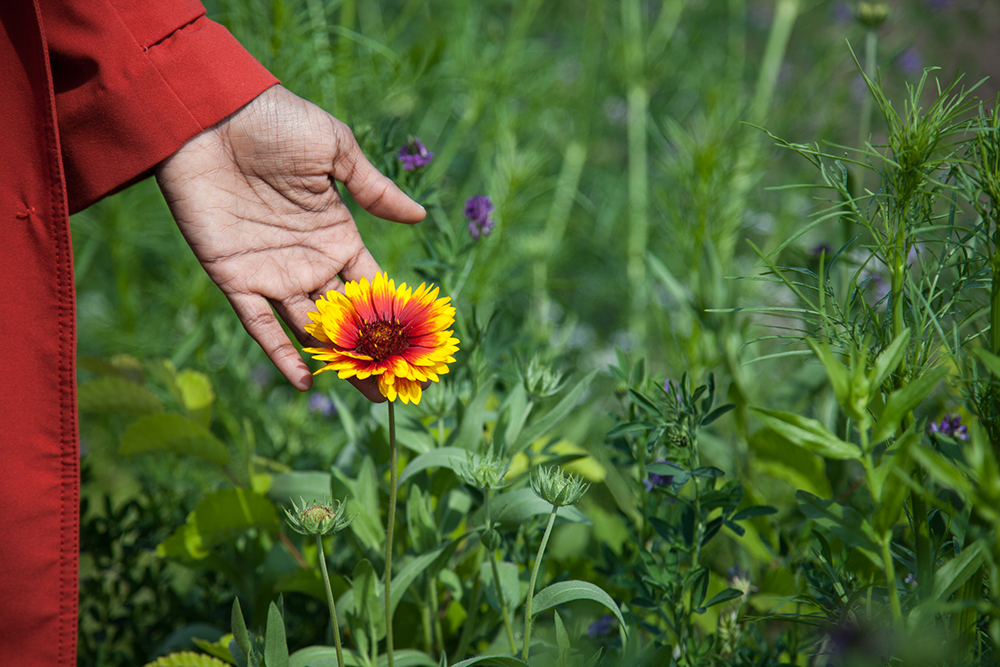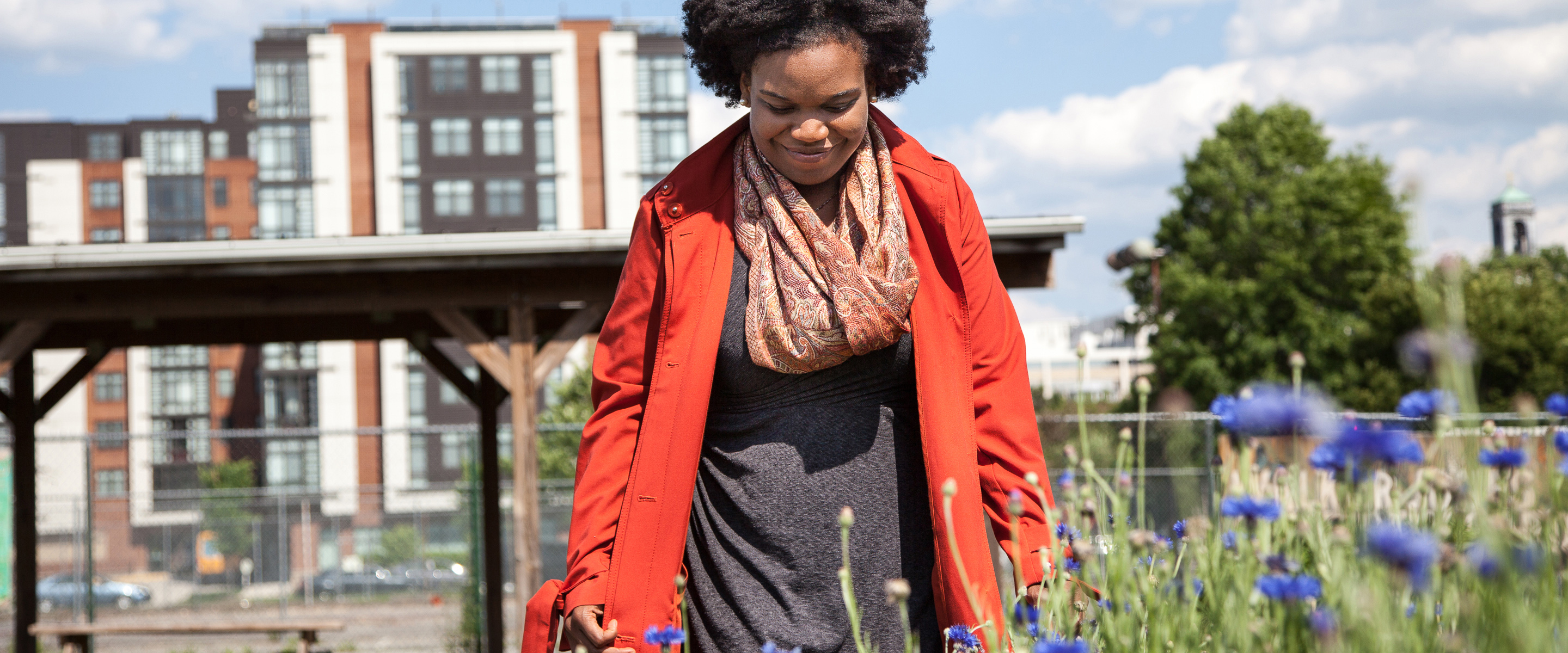From an early age, Asha Carter was told that she had a special purpose on this earth. "I was told not to mess up my destiny for myself, and not to mess it up for the rest of us." As a child in Atlanta, she became well versed in issues of justice. Her grandmother worked with the Black Panthers, and her parents had been attacked by Klansmen at racial justice demonstrations in the eighties. They were frank with her about the responsibility of her race. "You are a black girl, so when you walk into a room, you don't represent just yourself. You take all of us with you. Whether you want to or not. It's just the way it works here."
At nine years old, Asha would come home from school and watch Oprah on TV, followed by the news. Then she'd dissolve into tears, full of questions about the current state of the world. "Who's doing something about this?" she'd ask her parents. "I don't understand how you can have a job that isn't doing something about how screwed up everything is." She already felt compelled to do justice work, "some sort of work for the people, with the people, somehow."
One of the greatest opportunities in the food justice space is to value the lived experience of the people who are most impacted by the issues.
Now 27, Asha has developed that early sense of injustice into a focused purpose. She works in Washington, DC, as the Food Justice Strategist at DC Greens, a well-respected nonprofit doing community engagement work around food justice. At the heart of Asha's work is her desire to see people have sovereignty over their own lives, rather than having decisions made for them, and for them to have the tools and resources to fight for that sovereignty. In her opinion, one of the greatest opportunities in the food justice space is to value the lived experience of the people who are most impacted by the issues. "If you've figured out how to survive under this system, you probably know a lot about it."

Carter reviews material about Ward 8 in DC, where grocery stores are rare. The area's 80,000 residents are 96% non-white, have a median income of $31,890, and a life expectancy of 69.
By the time she joined DC Greens, she had already had a long and seemingly magical career. While studying Peace and Justice at Wellesley College, she served as a speechwriter and legislative advisor to Georgia State Representative Keisha Waites, and as an intern at Alternatives for Community and Environment (ACE), an environmental justice community organizing nonprofit in Boston. At ACE, she supported the youth organizers of the Roxbury Environmental Empowerment Project (REEP) and their campaigns for food and transit justice. The group created a guerilla gardening campaign called Grow or Die, and their message was "We have the right to be healthy. The food system we currently have here gives us death and sickness, and we deserve health and life." Asha found its place-based community organizing invigorating, and she learned a lot about her own place in the work. "Many of the group's members came from similar socio-economic and racial backgrounds as I did and were the same age. But I wasn't from Roxbury or Dorchester, and I was attending an elite women's college outside the city - their space wasn't for me to lead in. In connecting with, and learning from the REEPers, it became evident to me that these young people had an incredible amount of knowledge and expertise that people should be learning from."
A year out of college, in 2014, Asha was working as a temp at a staffing agency in Boston when she received a dream email. Her name was on the shortlist for a position in the Obama administration. Her family scrambled to pull together enough money to buy her a bus ticket to Washington, DC. "You know, baby," her father told her on the morning of her interview, "that $100 wasn't a little money, so make it count!" Which she did: at 22 years old, she was hired as Special Assistant to the Chief of Staff at the Environmental Protection Agency (EPA).
After her time at EPA, Asha yearned to be closer to the ground again, in a local organization. That yearning led her to DC Greens in 2016. At the time, DC Greens identified itself as a food access organization. (Asha later co-facilitated the organization's first strategic planning process, where it came to define itself as a food justice organization for the first time.) DC Greens manages the city's Produce Plus program, an income-based farmers-market nutrition incentive program for DC residents. Participants may receive up to $10 twice a week to spend on produce at a farmers market. People often wait as much as two hours in line for those ten dollars, with no guarantee that the checks will outlast the line. On average, if they visit two markets a week to get the full $20, they spend three to three and a half hours waiting in line. In 2018, the Produce Plus program, funded by the DC Department of Health, helped to feed 19,000 District residents.
If you're talking about people having access to food, what you're really talking about is structural poverty and structural racism.
Washington, DC, once a predominantly black city (it was once known as Chocolate City), has been undergoing dramatic gentrification and is now majority white. In 2016, median white family income grew to more than $120,000 per year, while black income fell to below $40,000. The average white family's net worth was $284,000, and the average black family had assets worth just $3,500. Homeownership is a primary driver of wealth creation, and in DC a white family is nearly twice as likely to own a home as a black family. The list of racial disparities goes on and on - in education, employment, health, the criminal justice system, and food access.
"If you're talking about people having access to food," explains Asha, "what you're really talking about is structural poverty and structural racism. If you don't understand those things, you're only going to create programs that are Band-Aids. You're not going to create something that actually shifts the relations of power for folks and make it so people are actually able to sustain themselves."

With her $15 in Produce Plus checks, one customer purchased fresh blueberries, kale, cucumbers and fava beans from a local farmer at DC's H Street Market.
Asha wanted to hear directly from the people being served by DC Greens, so she created a Story Gathering project. "We mostly focused on talking with people with a lived experience of food insecurity in the city. When we asked them, 'What is your vision of food in your community and how would you want people to access food?', they had difficulty answering the question and would mostly talk about housing. Because if your housing is unstable, your ability to cook food and maintain food for yourself is also going to be unstable. If you're living in housing that isn't maintained well by the owner, and your stove or refrigerator doesn't work, and if you're paying two-thirds of your income for housing (like I was when I worked in Boston), you have substantially less money for food.
"People are not leading single issue lives. When people are experiencing a lack of access to healthy food, they're also experiencing a ton of other things at the same time. And so part of what food justice acknowledges is the layered histories of exploitation that our food system is built on, and that any solutions we build have to arise out of that understanding. There is a deep interconnectedness between us, the environment, and the histories we live in together, and that interconnectedness requires us to create multifaceted solutions."
People are not leading single issue lives.
She realized she had to change the questions she was asking in the project. When she posed the question about an ideal food system with the opening, "If you could wave a magic wand...," respondents felt freer to think outside of what they already knew. They painted a picture of gardens on every roof and an intergenerational food system built around everything residents needed in community. Their ideal was not having a big box grocery store.
With the rapid gentrification in the city, people will ask, "If you put a grocery store in my neighborhood, am I going to be able to afford to live here anymore? I would love a grocery store...I don't have one, and I need food, but..." Most residents buy their food from corner markets or gas stations. Hunger is not the overriding concern; the poor quality of available food is.

The line on a hot Saturday morning to receive Produce Plus benefit checks at DC's H Street Farmers Market.
Out of the Story Gathering project, Asha created a Community Advocates program, which trains people with a lived experience of food insecurity to advocate for themselves, and pays them for their time. Advocates receive training on the industrial food system, food justice as a framework and how it interacts with other parts of the system, history, economics, and culture. "We talk about everything. Community organizing, advocacy. How to be a spokesperson for an issue, how to testify at City Council meetings. We offer lots of training and practice support.
"So many of the spaces in the city where decisions are being made about people's lives-the City Council, for example-are spaces where those decisions are being made by people who do not have a lived experience of the issues they are trying to solve. So what you get are these programs that have low participation rates, and the problems persist. The programs are not actually working for the folks most impacted. In DC at least, there are people in those decision-making bodies that want to hear from people who have direct experience. At the same time, there are people who want to be able to do the work of self-determination and improving their communities, but don't even know where those decisions about their communities are being made. People already have so many assets-not only their lived experience, but their social capital and existing networks as well. It's important to invest in them, and their leadership. Paying people for their expertise, just as all the decision-makers in a room are paid for theirs, is an opportunity to really value what people can offer."
If you believe that this system we have now is either going to collapse or needs to collapse, then it changes the context that you are doing your work in. It's both a challenge and an opportunity.
A graduate of the Community Advocates training now runs that program, and Asha has been promoted to Food Justice Strategist. She works internally at DC Greens to help create a truly equitable organization. Asha is helping the staff better understand what "food justice" means and move the organization from a food access lens to a food justice one, with a deeper understanding of the structural foundation of racism in the food system and a strategic plan to develop programs that actually have sustainable impact. She has close relationships with her coworkers, but admits that it isn't always comfortable to be in the role of challenging people's understanding of the world. "People are well meaning, but they may not understand. But you're in a relationship and you are working over time, holding each other as you move through this process together."

Asha says goodbye to the many flowers at the K Street Farm, knowing that the neighborhood is losing its lush urban garden in favor of an electrical substation.
Asha goes on to say, "If you believe that this system we have now is either going to collapse or needs to collapse, then it changes the context that you are doing your work in. It's both a challenge and an opportunity. I have this deep belief that there is something beyond this. I have to believe that we were born to this generation to do something. I think a lot about my relationship with and my responsibility to my ancestors given the things that they went through. I think of the phrase 'You are your ancestors' wildest dreams.' I know I had somebody dreaming for me to be free, to travel at my leisure, when there was no way they could do that. I think very critically about my time and where I put my life force. I want to put it into work that will allow people who have been stomped on to be free. To be healthy. For those things to be possible. We can do better."
Lise Metzger is a freelance photographer based in Washington, DC. She writes and photographs the project Grounded Women: Stories of Women who Farm. She is a tireless advocate for a healthy and just food system, and as a CSA site host, she loves to connect people to the source of their food. You can find her at www.lisemetzger.com and www.groundedwomen.com and on Instagram as @groundedwomen.










